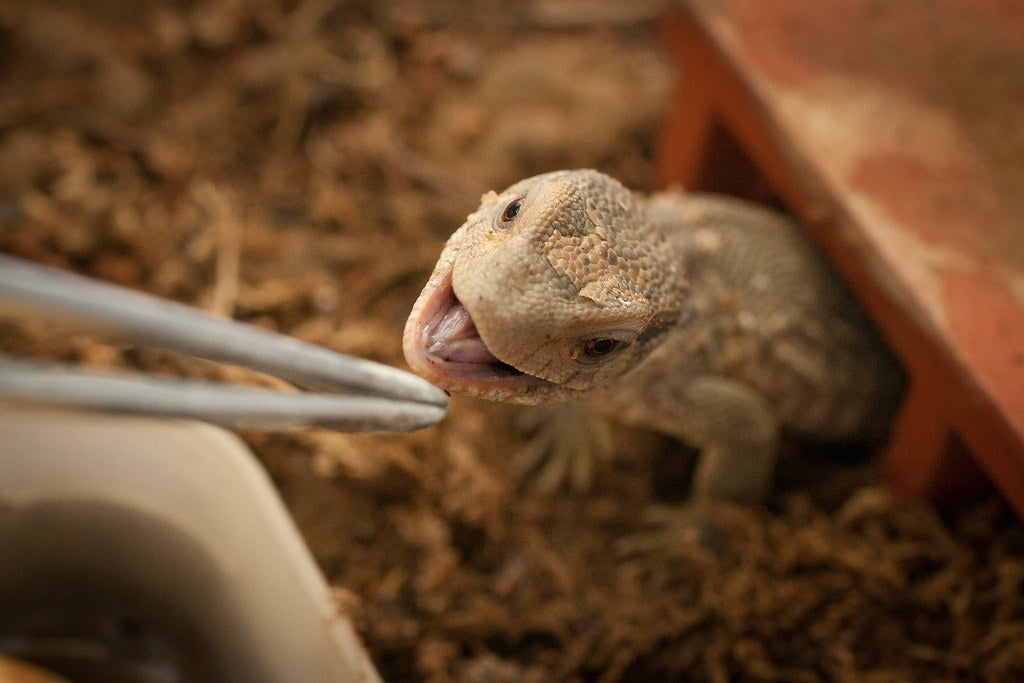
What Can My Savannah Monitor Eat?
Savannah monitors are 4’ long lizards native to the savannahs of sub-Saharan Africa. They have an insectivorous diet, which means that most of their nutrition naturally comes from insects, despite their size. In the wild, they are known to eat snails, millipedes, beetles, crickets, locusts, scorpions, and various insect larvae.
Can savannah monitors eat small animals?
A common misperception about savannah monitors is that they need bird and mammal prey as a regular part of their diet. However, birds and particularly mammals are very high in fat and/or calories compared to insects, which is a common contributor to severe obesity among captive savannah monitors.
However, wild savannah monitors are known to occasionally eat carrion and lizard eggs, so occasionally offering a lean young adult rodent, bird, or chicken egg for diversity is fine.
How often should I feed my savannah monitor?
According to field research conducted by Daniel Bennett, savannah monitors will eat up to 150 insects/day for 5-6 months out of the year, up to 10% of their own body weight.
How does this translate to keeping them healthy in captivity? According to experienced keepers, both juveniles and adults should be fed as many insects as they will eat daily. However, adults should be allowed to fast for half of the year (4-6 months), as this is their natural cycle in the wild, and their bodies are built for it.
All feeder insects should be lightly dusted with calcium powder.
What are the best insects for savannah monitors?
- Dubias
- Hornworms
- Silkworms
- Black soldier fly larvae (Nutrigrubs)
- Superworms
- Mealworms
- Crickets
- Discoids
- Ivory head roaches
- Locusts/Grasshoppers
- Scorpions
- Centipedes
- Snails
Waxworms, butterworms, eggs, and vertebrate prey items are fine to offer as treats, but should not be a routine part of a savannah monitor’s diet in order to help prevent obesity.
Can I feed wild-caught insects to my savannah monitor?
You should never feed your savannah monitor wild-caught bugs that you found outside. As tempting as it may be, keep in mind that they may be contaminated with pesticides, parasites, and/or diseases that will seriously harm your pet. It’s best to play it safe and stick with captive-bred insects from high-quality sources.
Which insects are toxic to eat?
On the subject of bugs that shouldn't be fed to your savannah monitor, there are certain insects/arthropods that you should avoid feeding to any reptile because they are toxic and can make your pet sick. In extreme cases, eating just one toxic insect can kill a reptile.
- Bees
- Fire ants
- Fireflies (lightning bugs)
- Hornworms (wild)
- Ladybugs
- Monarch butterflies and caterpillars
- Queen butterflies
- Spiders
- Wasps
If your monitor does end up ingesting one of these, seek veterinary attention immediately.
Can my savannah monitor eat fruits and vegetables?
Given that savannah monitors are strictly insectivorous, plant matter is not a natural part of their diet and should not be offered in captivity.
Supplementation for Savannah Monitors
Supplements are an essential part of any pet reptile’s diet, but this is especially the case for insectivores, since calcium supplementation is needed to balance the calcium:phosphorus ratio in captive-bred insects. However, multivitamin powder is also necessary to help prevent vitamin deficiency.
All feeder insects should be dusted lightly with calcium, which can be done by putting the insects into a plastic bag with some calcium powder and shaking lightly. It’s okay to skip dusting occasionally. Multivitamin supplement should be added to the calcium powder weekly. Alternatively, you can use an all-in-one supplement.
Recommended calcium and multivitamin powders include:
- Repashy Supercal
- Zoo Med Repti Calcium without D3
- Exo Terra Calcium Powder
- Repashy Supervite
- Zoo Med ReptiVite with D3
- Exo Terra Multi Vitamin
- Repashy Calcium Plus LoD
Gut-Loading Your Feeder Insects
It’s not enough just to dust supplement powder on feeder insects. To really make sure that your savannah monitor is getting the best nutrition possible, feeders need to be gutloaded.
What is gutloading? Gutloading is the practice of making sure that feeder insects are well nourished and hydrated before feeding them to your pet. This maximizes their nutritional value and vastly reduces the likelihood of nutritional deficiency in your pet.
The easiest way to do this is by using water crystals and a commercial insect gutload formula. For best results, feed insects for at least 48 hours before offering, and use a rotation of gutloads to create a varied diet. Here are some options:
Water
Savannah monitors may be from a relatively arid climate, but that’s not a reason to dehydrate them. You will need a large water bowl in the monitor’s enclosure at all times. Change the water at least twice a week and scrub the bowl with a reptile-safe disinfectant weekly, or whenever it becomes soiled.

Comments
Leave a comment